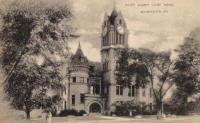Wilkes County, Georgia

Brief General Background
Wilkes County was established by Georgia's first state constitution -- the Constitution of 1777, which became effective Feb. 5, 1777. Because Wilkes is the first county in the list of eight counties created by Art. IV of that document, it is considered Georgia's first county. Unlike the other seven counties (which were fashioned from existing colonial parishes), Wilkes was created from the "ceded lands north of Ogechee" -- a reference to the land ceded in 1773 by the Creeks and Cherokees in their respective Treaties of Augusta.
Wilkes County was named for British politician John Wilkes, who supported the cause of the American colonies' cause in the House of Commons.
Between 1790 and 1854, the legislature took land from Wilkes County to form Elbert County (1790), Oglethorpe County (1793), and Lincoln County (1796), and to help form Warren County (1793) and Taliaferro County (1825).
Family Connection
Some many years ago, my father, his brother, and I took a roadtrip to Wilkes County, Georgia. Aside from general sight-seeing along the way, the primary objective of the trip, for Dad and Uncle, was to experience the area in which their father and his siblings were born and their grandfather was raised. For myself, the shared experience was supplemented by a desire to "get on the ground" with family history research. There was a county courthouse to embrace, three or four cemeteries to discover, two or three parcels of land to tract down, and, possibly, a few distant relatives to locate!
During the course of our journey of discovery, we took some time to visit some of the local, historical sights on offer in this old and rather famous county. The site of the current courthouse, for example, is where Jefferson Davis met for the final time with his Cabinet and dissolved the Confederate States of America. We toured the Toombs House; the former residence of Robert Toombs, member of the US House of Representatives and the first Secretary of State for the CSA. We toured the Revolutionary War Kettle Creek Battlefield where, in 1779, "patriots" defeated "British Loyalists." There also was Mt. Pleasant, just east of Washington, where in 1793 Eli Whitney perfected his revolutionary invention, the cotton gin.
The last stop on our cultural sashay was the Calloway Plantation. Now an open-air museum, the Calloway Plantation once was a 3,000 acre cotton plantation dating from the mid-1780's. Fascinating in it's own right as an historical, social, and cultural artifact, the museum presented one gem that none of us could have anticipated. That gem came in the form of a sharp and lively 93 year-old gentleman who spent most of weekdays serving as a docent of the museum. He was eager to converse about the museum, Wilkes County (in which he had spent his entire life to that point), and pretty much anything and everything else. During the course of our introductions and conversation, he wondered aloud just what or who had brought us to "his neck of the woods." We told him, rather generally, that our Noggle family had an ancestral connection to the county. After a brief moment of reflection, Russell replied, "That wouldn't be Kit Noggle would it?"
The ensuing exchange with Russell, most enjoyable in a number of ways, would significantly advance and enhance my family history research in a singular way. As it turned out, Russell had once, as a quite young child and with his father, met William Christopher "Kit" Noggle. And while not much was recalled from that brief meeting, he did recall some information about Kit Noggle that was mentioned by his father (and other adults) at later times. Honestly, I had no problem, even given our brief acquaintance, imagining Russell (then as now) eagerly soaking up whatever information, stories, and simple gossip to which he was exposed.
According to Russell, Kit Noggle's wife-a Welch-left eastern North Carolina with her family before the war's end and moved to Graball, Georgia (in nearby Lincoln County). After the war, Kit joined his wife-who would die within two years-and his Georgia-born son, Alonzo.
As the fates (or something) would have it, everything in Russell's recollection has subsequently proven to be not only true, but a break-through for our family history research. Prior to talking with Russell, I had no idea to whom William was first married, who was the mother of Alonzo, or-given conflicting evidence-whether Alonzo was born in North Carolina or Georgia. Armed with the Welch surname, a wealth of information would lay ahead.
